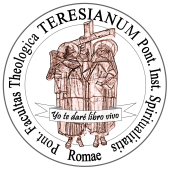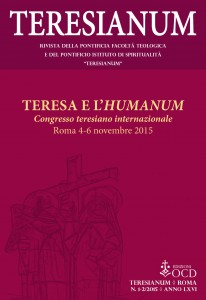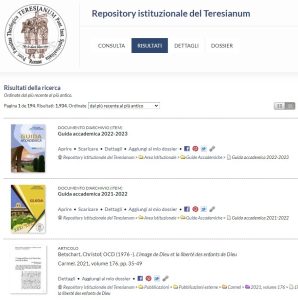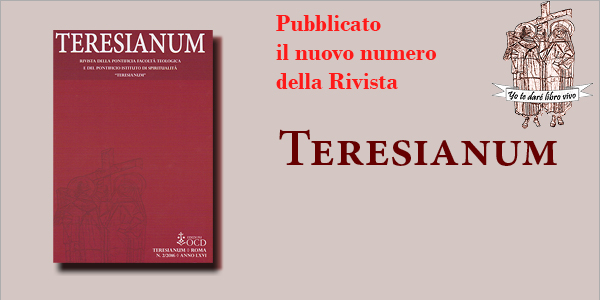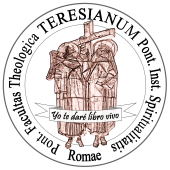70 anni fa, la rivista Ephemerides Carmeliticae fu fondata per promuovere una riflessione approfondita sulla vita e sulla dottrina del Carmelo in seno alla Facoltà di Teologia dei santi Teresa di Gesù e Giovanni della Croce, che diverrà “Pontificia” nel 1963 e che prenderà il nome “Teresianum” a partire dal 1982, in occasione del quarto centenario della morte di Teresa. Nello stesso tempo, la rivista adottò il nome Teresianum, rimasto identico fino ad oggi. In un contesto teologico e culturale assai diverso, la nostra missione rimane ancora quella di manifestare le potenzialità teologiche, particolarmente degli autori carmelitani. Ulteriori informazioni…
Acquista online…
Contenuto del numero 68 (2017/1)
Denis Chardonnens, La semplicità di Dio Trinità
ABSTRACT: «The unity of the three persons is the greatest unity, due to the simplicity of essence». This reference to saint Thomas Aquinas (cf. 3 Sent., d. 1, q. 2, a. 5, ad 4) provides an adequate summary of our purpose in the present contribution. Unity and plurality are herein considered as part of a theological understanding of the truth of Trinitarian faith, which is based on the simplicity of God. Our reflection focuses on the attribute of simplicity, in connection with the other attributes, in an endeavor to better understand the unity of being and essence in God Trinity. Our research here considers in particular the doctrine of transcendental multitude as related to the definition of the person which, in God, is «subsistant relation». A reflection of this kind enables us, in the life of faith, to more fully receive the ineffable riches of the consubstantial Trinity in which, through grace, we participate in Christ.
Teresa Gil Muñoz stj, La noche oscura en el itinerario espiritual de Teresa de Jesús. Interpretación cristológica
ABSTRACT: The Dark Night of the soul is a purifying experience within the mystical life of Teresa of Jesus. In the present article we shall consider one of the fundamental aspects of this Night: its Christological dimension. Based on an analysis of her vision of hell and in reference to a study of the Sixth Dwelling Places, this spiritual experience is described here as the process by which the person is identified with Christ, and thus enters into the Paschal Mystery. Two Christological experiences guide this interpretation: Christ’s kenosis and his descent into hell. The transformation by which the silkworm becomes a butterfly is the symbolic indicator by which this Christological reading of Teresa’s Dark Night is accomplished.
Iain Matthew ocd, Visualising Christology: Llama de amor viva and the Resurrection
ABSTRACT: The article seeks in Juan de la Cruz light on what it means for Christ to be risen; what that means for humanity, and what for Christ himself. We concentrate on the writing Llama de amor viva, consider its experiential quality, and identify “the Bridegroom” there as Christ in the Trinity. This enables us to gather from Llama global impressions of Christ’s power and vitality. We then look to Llama for evidence of how Christ establishes his lordship in Juan; and for evidence of how Llama discloses something of the risen Jesus’ praise of his Father.
José Pereira ocd, Ouvrir la bouche du désir. Éros dans le Cantique Spirituel B de saint Jean de la Croix (II)
ABSTRACT: In the first part of this article we attempted to define “eros”. In the second part, we shall read the Spiritual Canticle B based on this definition. We shall discover that eros, with its human basis, is God’s gift, enabling us to receive His gift of self to us. It is also what brings us to conformity with God’s only Son.
Michael Champagne cjc, The Experience of Jesus’ Thirst in the Life of St. Thérèse
ABSTRACT: Saint Thérèse underwent a deep personal encounter with the thirst of Jesus, an experience which intensified her love for Him and established a certain change of direction in her life. The experience was initiated by God, and the result was a lasting change in her soul. Saint Thérèse encountered Jesus’ «I thirst» from the cross as a word of life. She listened to it, she took it to heart, and in her life it yielded fruit a hundredfold (cf. Mk 4,20). Thérèse’s encounter with Jesus’ thirst and the significance it played in her spiritual life is the subject of the present article.
Recensioni
Studi carmelitani
- Ioannis Soreth, Expositio paraenetica in regvlam carmelitarvm, edidit Bryan Deschamp, Corpvs Christianorum. Continuatio Mediaeualis 259, Brepols Publishers, Turnhout 2016, 228 p., ISBN 978-2-503-54765-7 (Silvano Giordano).
- Tommaso di Gesù, Trattato della contemplazione divina, Introduzione, traduzione e note a cura di Elisabetta Zambruno, Sapientia 70, Glossa, Milano 2015, LIV+201 p., ISBN 978-88-7105-352-3, € 20 (Silvano Giordano).
- Alicia Silvestre Miralles, La traducción bíblica en san Juan de la Cruz: Subida del Monte Carmelo, Colección Humanidades, n. 118, Prensas de la Universidad de Zaragoza, Zaragoza 2015, 446 p., ISBN 978-84-16515-23-3, € 29 (Bruno Moriconi).
- Julen Urkiza, Procesos de Beatificación y Canonización de la madre Teresa de Jesús, Tomo V: Procesos remisoriales in specie de Valladolid, Burgos, Alcalá de Henares, Cuenca-Valera-Villanueva de la Jara, Málaga y Roma (1609-1610), 1004 p., ISBN 978-84-8353-734-3, € 57; Tomo VI: Últimos pasos de la S. Congregación de Ritos hacia la Beatificación y Canonización (1609-1622), Monte Carmelo – Ediciones El Carmen – Editorial de Espiritualidad, Burgos 2016, 959 p., ISBN 978-84-8353-793-0, € 57 (Dámaso Zuazua).
- Tomás Álvarez (ed.), Dizionario di Santa Teresa, Edizioni OCD, Roma 2016, 679 p., ISBN 978-88-7229-613-4, € 39 (Ciro García).
- Luigi Borriello, Edmondo Caruana, Maria Rosaria Del Genio, Raffaele Di Muro (edd.), Nuovo Dizionario di Mistica, LEV, Città del Vaticano 2016, 2240 p., ISBN978-88-209-9865-3, € 85 (Ciro García).
- Jerome Lantry, Praying with St Teresa through the Way of Perfection, Teresian Press, Oxford 2015, 148 p., ISBN 978-0-947916-16-9, £ 5.00 (Robert Cheaib).
- José Luis Cancelo García, Santa Teresa y los agustinos. El agustinismo de santa Teresa y la defensa agustiniana del espíritu teresiano, Monte Carmelo, Burgos 2016, 208 p., ISBN 978-84-8353-769-5, € 16 (Cristiana Dobner).
- Rosa M. Alabrús, Ricardo García Cárcel, Teresa de Jesús. La construcción de la santitad femenina, Cátedra, Madrid 2015, 271 p., ISBN 978-84-376-3419-7, € 18 (Cristiana Dobner).
- Ana María Salto Sánchez del Corral, Genialidad femenina y feminismo en la mística: La autobiografia de Teresa de Jesús; María Mercedes Benito Revillas, ¡Qué vivan las feas!, Instituto de Estudios Almerienses, Almería 2016, 207 p., ISBN
978-84-8108-622-5, € 6 (Cristiana Dobner). - Marie-Paul Stevens, Guérie! Une maladie traversée en compagnie de sainte Élisabeth de la Trinité, Éditions du Carmel, Toulouse 2106, 149 p., ISBN 978-2-84713-439-1, € 15 (Chiara Zacchi).
- Bernard Sesé, Elisabeth de la Trinité, Artège, Paris 2016, 192 p., ISBN 979-1-03-360164-7, € 9,90 (Manuela Romano).
- Eduardo Sanz de Miguel, Santa Isabel de la Trinidad, vida y mensaje, Monte Carmelo, Burgos 2016, 136 p., ISBN 978-8-483-53803-6, € 5 (Manuela Romano).
Teologia
- Christoph Theobald, Selon l’Esprit de sainteté. Genèse d’une théologie systématique, Cogitatio fidei 296, Cerf, Paris 2015, 539 p., ISBN 978-2-204-10586-6, € 29 (Denis Chardonnens).
- Armando Aufiero, La questione teologica del soffrire. Il profilo morale e cristiano dell’esperienza della sofferenza nell’opera di Luigi Novarese, Edizioni CVS,
Roma 2015, 334 p., ISBN 978-88-8407-235-1, € 25 (Bruno Moriconi). - Leonardo Paris, Teologia e neuroscienze. Una sfida possibile, GdT 393, Queriniana, Brescia 2017, 336 p., ISBN 978-88-399-0893-3, € 21,50 (Christof Betschart).
- Luca Bassetti, La lettera e lo spirito. Storia dell’ermeneutica cristiana delle Scritture, Il Pozzo di Giacobbe, Trapani 2016, 433 p., ISBN 978-88-6124-624-9, € 33,00 (Giovanni Chifari).
- Giuseppe Fossati, Poveri, casti, obbedienti. I consigli evangelici nella vita dei preti, Cammini di Chiesa, Edizioni Dehoniane, Bologna 2015, 134 p., ISBN 978-
88-10-51233-3, € 11,50 (Grzegorz Firszt). - Piero Coda, Alessandro Clemenzia, Julie Tremblay (edd.), Un pensiero per abitare la frontiera. Sulle tracce dell’ontologia trinitaria di Klaus Hemmerle, Collana di
Teologia 87, Città Nuova, Roma 2016, 248 p., ISBN 978-88-311-33920-0, € 20 (Luca Bassetti).
